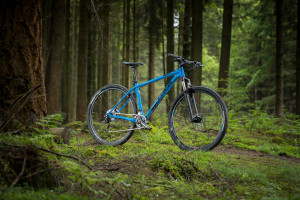
- Progressive geometry offers up confident handling, no matter how rowdy it gets
- UK-made steel chassis offers up something a little different
- Decent value for a small brand, plus custom finishing kit possible
- Cane Creek suspension units aren't as supple as Fox or RockShox counterparts
- Shimano XT brakes had bite point shifting issues
- Sluggish uphill due to a bit of excess weight
Cotic's updated Rocket might buck the trend by using a UK-made Reynolds steel frame, but it's every inch the progressive long-travel trail/enduro bike thanks to geometry that allows you to extract every last ounce of performance from the 650b wheels. The Cane Creek shock and fork on this complete build aren't as polished as big-name rivals, but it's still a very good bike for the money.
- Big Read: Big mountain pairs racing with Enduro2 Les Arcs
- The best trail and enduro mountain bike wheelsets, tried and tested
- Five things that weren't cool - until enduro happened
While the Rocket has a rich history since it was first introduced, this new version keeps all the essential elements but refines them a bit further. The Reynolds 853 steel front triangle paired to aluminium chainstays remains, as does the linkage driven single pivot design. However, that front triangle is now made in the UK rather than Taiwan, while rear wheel travel has been pumped up to 165mm over 160mm, with a tweaked shock stroke and kinematic.
The frame geometry has also had a bit of work, with a slightly steeper 76° effective seat angle to improve the climbing position, though the head angle remains the same at a measured 64° with a 170mm fork. Cotic's Longshot geometry is in full effect with a reach that's now a very respectable 463mm on this medium - a figure you'll usually see on large framed rivals.
That means there's oodles of confidence enhancing stability, but the fact the Rocket sticks with 650b wheels means it's plenty handy when it gets tight and twisty. Those who prefer big wheels do have an option in the 160mm travel, 29" wheeled RocketMAX however.
This probably isn't the place to get into an extended thesis on the benefits of one wheel size versus another, but I get on better with the lower stack of 650b bikes (602mm on the Rocket versus 630mm on the MAX) as it's easier to boss the front end into corners on the sort of tight, twisty and steep terrain I prefer. Your mileage may vary depending on body shape, riding style, terrain and personal preference; as the saying goes, pick one and be a d*ck about it.
Either way, the 650b wheels don't mean the Rocket is a slough in the rougher stuff where 29ers are often presumed to excel. There's plenty of stability in the chassis, while the suspension redesign offers up plenty of plush traction with little misbehaviour in the form of pedal kickback. It's calm, collected and planted, allowing you to get on with the business of selecting the best (or least worst) line you can.
The move to a longer stroke shock has apparently made it easier to tune at either extreme of the weight scale, but it definitely delivers a smoother, more supple starting stroke. Though it's less progressive at the end of the travel, I found it to be nice and supportive, even without any volume spacers in the shock, so heavier (than 68kg) or harder riders have the ability to tune.
The chunky WTB 2.6" tyres - a spiky Vigilante up the front and lower profile Trail Boss out back certainly help when it comes to maximising traction too. Cotic has wisely specced a lighter casing but stickier rubber on the front with a heavy casing and faster compound at the back to balance grip and rolling resistance. Mounted up on the (no-cost option) Hunt Enduro Wide wheels, they've got a great profile and hook up with a positive feel, oodles of traction and break away progressively - just what you need for a bike like this.
However, it's not exactly hot off the mark uphill. The suspension is pretty well mannered and the Cane Creek shock's Climb Switch helps prevent excess bob and bounce while still letting your suspension work on technical climbs, but the 15.2kg/33.5lb mass does make itself known if you want to start sprinting about everywhere. Though the 76° effective (74° actual) seat angle isn't slack by most standards, it probably wouldn't hurt to go a bit steeper for a more weighted front end.
It's telling that Cotic totally revised the tubing on this iteration of the bike, with a custom selection from Reynolds made just for the Rocket. It shows where the priorities lie that the result is a stiffer and stronger frame that weighs the same - this is a bike that's meant to take use and abuse for years to come rather than a super lightweight racehorse.
Cotic offers a whole load of different builds on the frame, but this Gold level build gets a SRAM GX Eagle 12-speed groupset with 10-50T range and Shimano XT brakes. There's also a Shimano XT 12-speed build at £4799 without options. Both share the same Cane Creek suspension, with a Helm Air fork up front and DB Air Inline shock at the back.
The SRAM GX kit is totally functional - I'd possibly err towards the slightly sweeter shifting of the Shimano setup if it was my cash, but it's splitting hairs. I'm slightly less taken with the Shimano XT brakes, however; there's loads of power and good feel, but they suffer from the same wandering bite point as I've had on a number of other sets. I'd be tempted to plump for the £100 upgrade of SRAM's four-piston Guide RSC brakes to try and avoid that.
The Cane Creek Helm Air fork is well controlled and offers lots of damping adjustment with high and low-speed compression plus rebound available to tweak. The air spring has separately adjusted positive and negative chambers rather than the self-balancing design you'll find on most air forks these days.
That could be framed as an advantage as you can play about with the balance to get a feel you like, but for most people, it's an additional faff that makes tuning trickier. In absolute terms, it doesn't offer the same blend of small bump sensitivity and support as the latest units from RockShox and Fox, but it's still very capable. It's worth noting that Cane Creek has released a new version of the fork that claims to improve suppleness and mid stroke support.
It's a similar story at the back. You can twiddle with the four-way adjustable damping on the shock to get it set up perfectly, but even after a good amount of time spent playing I struggled to get it feeling quite as supple and sorted as a Fox DPX2 would after minimal faff.
Elsewhere, Cotic's own-brand 780mm aluminium bars and 35mm stem help keep things in line, while the OneUp dropper (£71 option) comes in 180mm or 210mm travel as stock but can be adjusted internally. It's smooth and has a great feeling remote - the brand also provides a rather neat upper chain guide that integrates with the bike's main pivot.
In summary
The fourth generation of Cotic Rocket builds on a solid foundation to deliver a really well-sorted ride with handling that'll flatter the timid and encourage the confident. It might be a touch on the heavy side, but it rewards you with hugely capable handling and the ability to bob and weave on tight, steep and twisty trails while still being able to dispatch burly terrain with ease.
It's hard to say whether the steel frame offers any perceptible ride benefits once you've chucked 2.6" rubber and 165mm of travel on top, but it's certainly a unique looking antidote to chunky carbon or hydroformed aluminium rivals. Cotic's direct sales model mean it's also not bad value by the standards of more niche (or UK made) brands either. The no-quibble 30-day sale or return policy and (lockdown excepted) roving demo fleet also mean you should be able to sample it yourself, should you want to try before you bike.

























Add comment